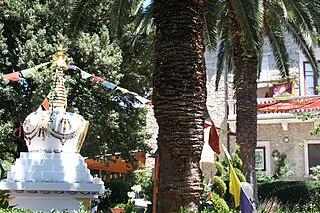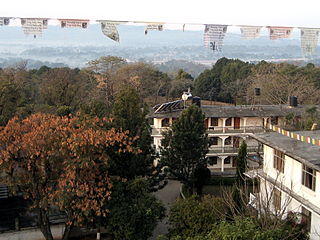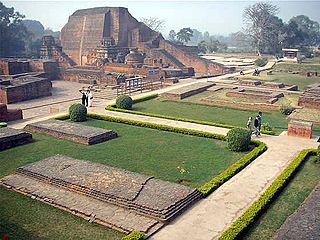
The Ganden Tripa or Gaden Tripa is the title of the spiritual leader of the Gelug school of Tibetan Buddhism, the school that controlled central Tibet from the mid-17th century until the 1950s. The 103rd Ganden Tripa, Jetsun Lobsang Tenzin died in office on 21 April 2017. Jangtse Choejey Kyabje Jetsun Lobsang Tenzin Palsangpo is the current Ganden Tripa.
Tenzin Wangyal Rinpoche is a teacher (lama) of the Bon Tibetan religious tradition. He is founder and director of the Ligmincha Institute and several centers named Chamma Ling, organizations dedicated to the study and practice of the teachings of the Bon tradition.
Tibetan Americans are Americans of Tibetan ancestry.

Lobsang Tenzin, better known by the titles Professor Venerable Samdhong Rinpoche and to Tibetans as the 5th Samdhong Rinpoche, was the previous prime minister, of the Central Tibetan Administration, or Tibetan government-in-exile, which is based in Dharamshala, India; Lobsang Sangay was elected to this position in April 2011.

Lama Tashi or Geshe Ngawang Tashi Bapu was the Principal Chant Master of Drepung Loseling Monastery, one of the largest monasteries of the Dalai Lama. In 2005-06, Lama Tashi was nominated for the Grammy Award for his album "Tibetan Master Chants" in the "Best Traditional World Music". Through this achievement, he has created the record of the first Buddhist Monk for Grammy Nomination in solo performance, and the first North-East Indian to be nominated for the prestigious Grammy Award the highest honour of Music in the world. Lama Tashi has also led Long Life Puja for the His Holiness the 14th Dalai Lama, the HE 99th and 100th Gaden Tripa Rinpoches and many more highly revered masters. The Long Life Puja is a very popular traditional healing ceremony that involves a multiphonic chant performance to heal the listeners and increase their life span. Lama Tashi has also led the chanting performance of the Traditional Great Prayer Festival at Bodh Gaya presided over by the HH 14th Dalai Lama in 2002. He has served as Principal and the Director of the Central Institute of Himalayan Culture Studies, Dahung, India from 2003-2012 and 2012-2018 respectively. While at the Institute, he was teaching Buddhist Philosophy at University level students.

Monlam also known as The Great Prayer Festival, falls on 4th–11th day of the 1st Tibetan month in Tibetan Buddhism.
Lhundub Sopa was a Tibetan monk.

Thupten Jinpa Langri has been the principal English translator to the Dalai Lama since 1985. He has translated and edited more than ten books by the Dalai Lama including The World of Tibetan Buddhism, A Good Heart: A Buddhist Perspective on the Teachings of Jesus, and the New York Times bestseller Ethics for the New Millennium.

8th Agya Hotogtu is one of the most prominent Buddhist teachers and lamas to have left Tibet. At age two, Arjia Rinpoche was recognized by Choekyi Gyaltsen, 10th Panchen Lama as the 20th Arjia Danpei Gyaltsen, the reincarnation of Je Tsongkhapa's father, Lumbum Ghe, the throne holder and abbot of Kumbum Monastery. He has trained with lineage teachers, such as the 14th Dalai Lama, the 10th Panchen Lama, and Gyayak Rinpoche—from whom he received many sacred teachings and ritual instructions.
Trisur Rinpoche Jetsun Lungrik Namgyal, also known as Khensur Lungri Namgyel, was born in 1927 in Kham was the 101st Gaden Tripa, the leader of the Gelug sect of Tibetan Buddhism.
Thekchen Choling is a registered Buddhist organisation in the Republic of Singapore. The organisation was started in 2001 by Namdrol Rinpoche and a group of his initial disciples. The organisation promotes non-sectarian Buddhism, emphasizing understanding of Theravada and Mahayana teachings.

The Istituto Lama Tzong Khapa (ILTK) in Pomaia, a village in Tuscany, in Italy is a branch of the Foundation for the Preservation of the Mahayana Tradition (FPMT), an international network of Gelugpa dharma centers. It is named for Tsongkhapa, founder of the Gelugpa monastic order of Tibetan Buddhism. The Dalai Lama has taught there on several occasions.

The Library of Tibetan Works and Archives(LTWA) is a Tibetan library in Dharamshala, India. The library was founded by Tenzin Gyatso, the 14th Dalai Lama on 11 June 1970, and is considered one of the most important libraries and institutions of Tibetan works in the world.

Lobsang Gyatso (1928–1997) was a Tibetan monk who founded the Institute of Buddhist Dialectics in India.

Established in early 2003, the Indiana Buddhist Center (IBC) serves the public by providing accurate information on the religion and philosophy of Buddhism in the lineage of the 14th Dalai Lama, Tenzin Gyatso. It is a federally registered 501(c)(3) non-profit Buddhist institute located in central Indiana that facilitates meeting places for meditation, prayer, retreats, and religious services for Budd hists and those interested in Buddhist Dharma. It provides a center for spiritual services that are Buddhist in nature. The IBC serves as a place of common meditation and gathering for Indiana Buddhists and those sympathetic to the Dharma. The center engages in events that further the understanding of Buddhist philosophy in the form of regular teachings and special events. Most activities are held in Indianapolis, Indiana. The center is located on two and a half acres of a beautiful park-like property. IBC offers instruction on Buddhist philosophy and meditation. Geshe Lharampa Jinpa Sonam is the resident Spiritual Director and Tenzin Namgyal serves as resident translator.

The Tibet Institute Rikon is a Tibetan monastery located in Zell-Rikon im Tösstal in the Töss Valley in Switzerland. It is an established as a non-profit foundation because Swiss laws resulting from the 19th century secularization movement did until 1973 not allow for the establishment of new monasteries.
Geshe Tsultim Gyeltsen was a Tibetan lama and human rights activist living in the United States. Gyeltsen had been described as "one of the last living Tibetan Buddhist masters to have been trained in Tibet" before 1959.

Rato Dratsang, also known as Rato Monastery, is a Tibetan Buddhist monastery or monastic university of the Gelug or "Yellow Hat" tradition. Rato was, for many centuries, one of the major monastic colleges in Tibet.

Tenzin Namgyal Tethong is a Tibetan politician and a former Prime Minister of Central Tibetan Administration.

Kyabje Khensur Kangurwa Lobsang Thubten Rinpoche, was a Buddhist monk, Abbot of Sera Jey Monastery, and the founder of Tibetan Buddhist Institute (Adelaide). Khensur means "former abbot" and Rinpoche means "precious teacher".
























